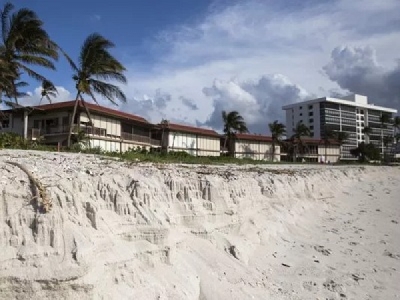
Posted on December 21, 2017
By Eric Staats, Naples Daily News
A year ago, beach advocates hoped they were a step closer to finding a potential solution to an offshore sand shortage in Southeast Florida.
The 2016 Water Resources Development Act authorized the U.S. Army Corps of Engineers to study using foreign sand, such as from the Bahamas, to widen shorelines without resorting to expensive and inefficient truck hauls from inland mines.
A year later, the study remains unfunded in the agency’s budget and corps planners are still awaiting guidance from Congress on how to proceed, corps spokeswoman Susan Jackson said.
In its “Shrinking Shores” investigation last year, the Naples Daily News reported that exhausted supplies of sand are increasing costs for beach renourishments needed to protect coasts from hurricanes and drive the state’s tourism economy.
Jackson cited an earlier study that found projects that used sand from the Bahamas did not meet the agency’s required cost-to-benefit ratio to qualify for federal money.
“So I don’t think this is the best route for Florida now, though it may be an eventual alternative,” Jackson said.
U.S. Rep. Lois Frankel, D-Boca Raton, said at the time that the study provision in WRDA 2016 was a compromise with supporters of a ban on spending federal money on beach projects that use foreign sand.
Frankel, in the House, and Sens. Bill Nelson and Marco Rubio have introduced bills in Congress to lift the ban, but they have gone nowhere.
“My focus is on removing the archaic provision that currently prohibits counties from bringing in foreign sand,” Frankel said this month. “I do not believe a study is necessary and the delay should not be an excuse to keep us from making this change.”
Besides the ban on foreign sand, backed by U.S. dredging companies, another law backed by dredgers prevents foreign-flagged vessels from bringing sand from foreign nations into the country. To get around the law, sand would have to be transferred to a U.S.-flagged ship, an expensive extra step.
Dredging company executives have said enough sand lies beneath domestic offshore waters to avoid having to resort to what they consider unreliable and unknown quantities of foreign sand.
The 2016 provision puts no timeline on the sand study, which includes domestic sand sources.
“The Secretary (of the Army) is authorized to undertake a study of the economic and noneconomic costs, benefits and impacts of acquiring by purchase, exchange or otherwise sediment from domestic and nondomestic sources for shoreline protection,” the provision states.
“Upon completion of the study, the Secretary shall report to Congress on the availability, benefits and impacts of using domestic and nondomestic sources of sediment for shoreline protection.”
Source: Naples Daily News





